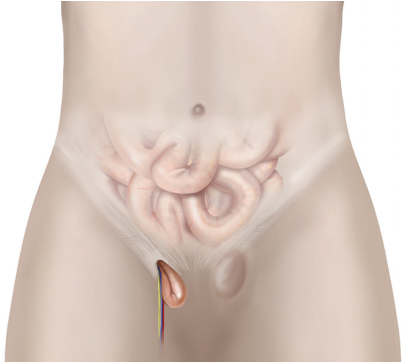What is an inguinal hernia?
Weak spots can develop in the layer of muscle in your abdominal wall, resulting in the contents of your abdomen pushing through. This produces a lump called a hernia (see figure 1). An inguinal hernia happens at the inguinal canal. This is a narrow passage in which blood vessels pass through your abdominal wall. A hernia can be dangerous because your intestines or other structures within your abdomen can get trapped and have their blood supply cut off (strangulated hernia).
What are the benefits of surgery?
You should no longer have the hernia. Surgery should prevent the serious complications that a hernia can cause.
Are there any alternatives to surgery?
You can sometimes control the hernia with a truss (padded support belt) or simply leave it alone. It will not get better without surgery.
What does the operation involve?
The operation is performed under a general anaesthetic and usually takes about 30 minutes (less than an hour for a repair to both sides). Your surgeon will make several small cuts on your abdomen. They will insert surgical instruments, along with a telescope, inside your abdomen and perform the operation. Your surgeon will return the part of the abdomen that is causing the hernia, and insert a synthetic mesh to cover the weak spot.
What complications can happen?
1. General complications
- Pain
- Bleeding
- Infection of the surgical site (wound)
- Unsightly scarring
- Blood clots
2. Specific complications
- Damage to internal structures
- Developing a hernia near one of the cuts
- Injury to your bowel
- Surgical emphysema
- Developing a lump
- Continued discomfort or pain in your groin
- For men, discomfort or pain in your testicle on the side of the operation
- For men, difficulty passing urine
- For men, damage to the blood supply of your testicle
How soon will I recover?
You should be able to go home the same day or the day after.
You may return to normal activities when you feel comfortable to do so, usually after a week. You do not need to avoid lifting but you may find it uncomfortable if you lift heavy weights during the first two to four weeks.
Regular exercise should help you to return to normal activities as soon as possible. Before you start exercising, ask the healthcare team or your GP for advice.
The hernia can come back.
Summary
An inguinal hernia is a common condition caused by a weakness in your abdominal wall, near the inguinal canal. If left untreated, an inguinal hernia can cause serious complications.
Acknowledgements
Author: Mr Ian Beckingham DM FRCS Illustrations: Medical Illustration Copyright © Medical-Artist.com
This document is intended for information purposes only and should not replace advice that your relevant health professional would give you.
